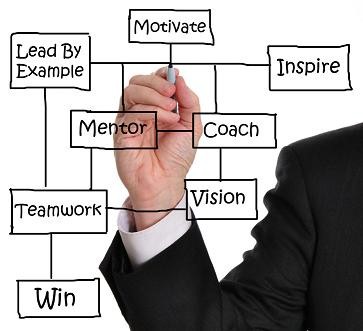Mentoring: Your Secret Weapon
Latest Posts
- 2024 Reading List for Leaders
(posted: 07/01/2024)The right book can be a leadership game-changer.
- Coach's Notebook: Exec Presence for Leaders
(posted: 05/08/2024)As a leader your charisma is critical. Learn how to develop it!
- New Year's Resolutions vs New Chapters
(posted: 02/01/2024)Forget New Year's...Your new chapter can begin when you are ready!
Blog Archives
Kristi posts to her site about once a month, but frequently more often. She also appears as a featured contributer on select other sites. If you would like to be notified when new blogs are posted, please subscribe to our newsletter.
If you are interested in Kristi guest posting to your site feel free to contact us.
Mentoring: Your Secret Weapon
(posted: April 20th, 2010)

As leaders, we appreciate the mentors, leaders, and role models upon whose shoulders we stood. We carefully consider the support and guidance we are consciously and unconsciously providing for those who come after us.
The journey of being a mentor or a mentee is an investment that can be, at a minimum, a way to grow. Or at best, a life-altering experience
In this blog post, I will focus on the impact these relationships can have on you and your organization as you grow your leadership skills. My next blog will share some practice tips for setting the relationship up for both short and long-term success.
First, let's define the terms of both "mentor" and "mentee":
men tor [men tawr, ter] noun
- A wise and trusted counselor or teacher
- An influential senior sponsor or supporter
men tee [men tee] noun
- A person who is guided by a mentor
A mentor is very much like a coach; being able to be compassionate, act as counsel yet isn't afraid to criticize constructively, and teach difficult lessons. A mentee must be fully engaged in the learning and development process.
Why is Mentoring Important?
The organizational and personal reasons to use mentoring are significant and long-lasting:
- Strengthened global workforce diversity. Mentoring proves to be a key ingredient in transforming individuals separated by age, gender, race or geography into a cohesive group or team.
- Development of critical leadership and management skills. You can broaden your business, industry and functional perspective.
- Knowledge sharing across cultural lines creates lasting global communications and teamwork.
- Mentors, mentees, and managers knowing that a program will continue to be available allows them to include mentoring in their formal and informal development plans.
At Sun Microsystems mentoring was used for larger corporate purposes in addition to improving the performance of individuals.
At Sun, mentoring has been used to bring in new or acquired individuals and groups, to improve the network between existing groups in different organizations, and to reduce isolation of those geographically distant from headquarters.
- Employee loyalty significantly increases as employees make lasting connections across functional and department lines.
- Enhanced bench strength in company leadership ensures successful succession planning and increases productivity.
- Increased creativity and innovation drives company sustainability in the marketplace
"If your top management isn't spending at least a half day a month sitting down with someone twenty five-years old or younger, then they are blowing it."
Tom Peters
Plan for Success

Being a mentor supports your organization, whether your mentee is within the organization or outside it; and being a mentee is an investment in your own future and success.
There may be misconception that the mentor/mentee relationship is one-way, with the mentor sharing experiences and teachings with the mentee and the mentee being the only one that gains from the relationship.
Mentor/Mentee relationships are a two-way street that can have a very positive impact on the career and personal development for both parties. That is if the relationship is set up for success. I have seen a number of “Mentoring Programs” in the workforce that are forced upon people with little structure or support. These also are without the few key elements will be end up being a big waste of time and lead to frustration with both parties.
Continuous improvement is accomplished by trial and error. So be patient and enjoy the ride!
- What is your mentoring strategy? Are you adding one mentor to your life every year?
- Does your organization have a mentoring program? Are you supporting your organization as a mentor?
I would love to hear how your organization has benefited from a short or long term culture of mentoring. Please look to my next blog post where I will share some tips for setting the relationship up for success.
